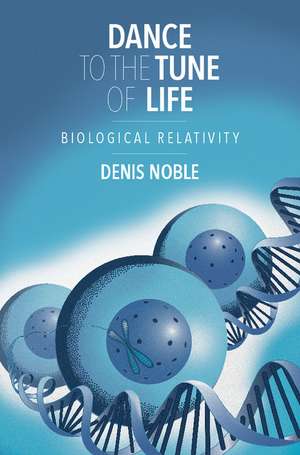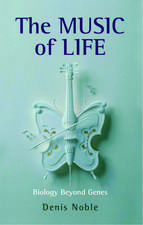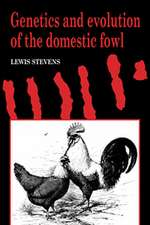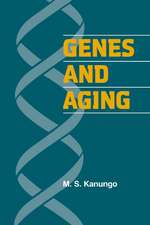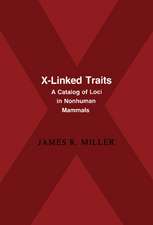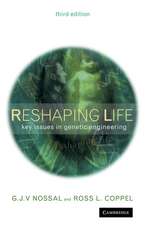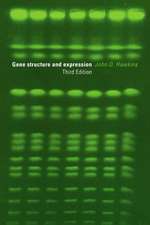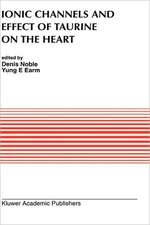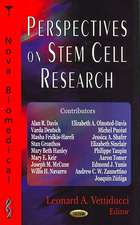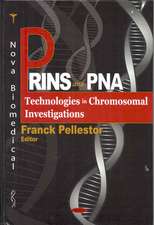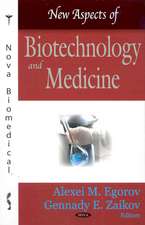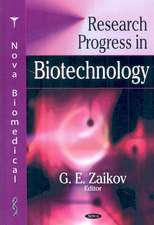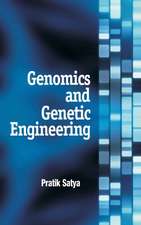Dance to the Tune of Life: Biological Relativity
Autor Denis Nobleen Limba Engleză Hardback – 30 noi 2016
Preț: 171.13 lei
Nou
Puncte Express: 257
Preț estimativ în valută:
32.75€ • 34.07$ • 27.04£
32.75€ • 34.07$ • 27.04£
Carte disponibilă
Livrare economică 22 martie-05 aprilie
Preluare comenzi: 021 569.72.76
Specificații
ISBN-13: 9781107176249
ISBN-10: 1107176247
Pagini: 302
Ilustrații: 21 b/w illus. 26 colour illus.
Dimensiuni: 160 x 235 x 20 mm
Greutate: 0.64 kg
Editura: Cambridge University Press
Colecția Cambridge University Press
Locul publicării:New York, United States
ISBN-10: 1107176247
Pagini: 302
Ilustrații: 21 b/w illus. 26 colour illus.
Dimensiuni: 160 x 235 x 20 mm
Greutate: 0.64 kg
Editura: Cambridge University Press
Colecția Cambridge University Press
Locul publicării:New York, United States
Cuprins
Preface; Acknowledgments; 1. The universe and the principle of relativity; 2. Biological scales and levels; 3. Biological networks; 4. Nature and origin of cells; 5. Blind chance and natural selection; 6. Biological relativity; 7. Dancing nucleotides: natural genetic engineering; 8. Epigenetics and a relativistic theory of evolution; 9. The relativity of epistemology: the meaning of it all; 10. Postscript; Glossary; Index.
Recenzii
'Among its many merits, this remarkable book deserves to become a classic text in the philosophy of science. Almost alone among philosophers of science, Noble is a practising scientist; and unusually among practising scientists, he is an accomplished philosopher. His book brings out, with unparalleled clarity, how the scientific endeavour involves not only empirical inquiry but also conceptual structure. Noble shows how, on the negative side, popular presentations of sound biological results may be vitiated by bad metaphysics, and how, on the positive side, science and philosophy may extend the boundaries of knowledge by a unified epistemology. He ends, however, with a salutary warning that there may well be a limit to the human capacity to know the answers to ultimate questions.' Sir Anthony Kenny, University of Oxford
'I think this a marvellous book. Denis Noble emphasises that genes, organs and systems dance to the tune of the organism and its social and physical environment. He sets the relativity of biology in a remarkable scientific sweep, ranging from cosmology to human belief systems. He reminds me of another great biologist, C. H. Waddington, to whom Noble pays handsome tribute. Writing with clarity and charm, Noble attempts to break down silos of knowledge inhabited by scientists who fail to come out and engage with others. … Broadening minds in an era of intense specialisation is more important than ever. Noble deserves to be successful in his desire to do just that and I hope that he will be.' Sir Patrick Bateson, University of Cambridge
'In my view Dance to The Tune of Life is a 'must read'. In it Denis Noble lucidly deconstructs how and why reductionism came to prominence in biology and led to the current state of molecular Humpty-Dumptyism. His central idea that there is no privileged level of causation is the first conceptual step to putting Humpty Dumpty back together again.' Michael J. Joyner, Mayo Clinic, Minnesota
'Denis Noble is renowned for his mission to reintegrate the physiological sciences with mainstream biology, including evolutionary theory. His new book combines clear exposition of basic principles with many valuable examples. He gives the reader, general or expert, a completely new view of life.' Yung E. Earm, Seoul National University, South Korea
'Dance to the Tune of Life is one of the most fascinating and impressive books I have ever read. Denis Noble, a world-renowned physiologist and systems biologist, has revolutionized our traditional notion of the nature of life. The title Dance to the Tune of Life mirrors the essence of the argument of the book. The life emerges from numerous biological processes at different scales and levels. Such actors and actresses, stage properties, and stage are not separately present they act together in harmony, dancing to a tune with a music performed by an orchestra, an organism. By describing his research experiences and achievements on the cardiac rhythm evolutionary biology, medicine, and philosophy, Denis has not only provided us with very modern knowledge of the biological reactions and their network but also described to us the nature of life. I believe that this book impacts everyone involved in biomedicine.' Yoshihisa Kurachi, Osaka University, Japan
'Having demolished the 'Selfish Gene' fiction, Noble in this marvelous book moves both science and philosophy from an antiquated 'either/or' static model to an 'and' model. 'Dance' shows elegantly and brilliantly that from the miracle of the ancient symbiosis of mitochondrial bacterial remnants in human cells, through the rock-solid interrelationship between genes and the feedback from the environment in all senses - from the core phenomenon of functional epigenetics, to the universe itself and our place in it - that we are, at heart, inter-beings, co-arising.' Samuel Shem, New York University
'Denis Noble is a pioneer in understanding human physiology through quantitative studies linking behaviour across multiple scales of biological organization - from proteins to cells, tissues, organs and organ systems. These studies have led him to characterize biological function in terms of a Principle of Biological Relativity: there is no privileged level of causation in biology, because living organisms are multilevel open stochastic systems in which the behaviour at any level depends on higher and lower levels, and so cannot be fully understood in isolation. This engaging book defends this view in depth, and thereby also provides strong support for an extended synthesis of evolutionary theory that goes beyond the Modern Synthesis of Neo-Darwinism. It is highly recommended as a thoughtful study of the kind of complexity real living organisms display.' George Ellis FRS, University of Cape Town, South Africa
'In this elegantly written and personal book world-renowned physiologist and systems biologist Denis Noble effectively argues for a fundamental revision of the theory of evolution. Against the reductionist, gene-centered approach of Neo-Darwinism, which has dominated biology for more than a century, Noble passionately pleas for a more integrated approach. Massively supported by recent postgenomic and epigenetic empirical research, Dance to the Tune of Life deepens and synthesizes ideas Noble earlier developed in The Music of Life. Biology beyond the Genome (2006) and subsequent writings. Just like Newtonian physics underwent a major transformation in the beginning of the 20th century due to Einstein's general theory of relativity, the life sciences are facing a no less fundamental transformation. Noble's book is a must read for anyone who wants to understand this transformation.' Jos de Mul, Erasmus University Rotterdam, Netherlands
'… enlightening … The illustrations are both vibrant and clarifying, giving this title a sparkle that compels you to imagine how each concept fits into the larger scheme. I commend this author for relishing the subtle reminders of what makes this inquiry important. It's a best read.' D. Wayne Dworsky, San Francisco Book Review (www.sanfranciscobookreview.com)
'… a very informative read … Noble's Dance to the Tune of Life is an illuminating account of why philosophy is necessary in doing science.' Sepehr Ehsani, Metascience
'The narrative is remarkable … Dance to the Tune of Life is a marvellous text reflecting on the complexity of biology.' Anna Holderbaum, The Biologist
'I think this a marvellous book. Denis Noble emphasises that genes, organs and systems dance to the tune of the organism and its social and physical environment. He sets the relativity of biology in a remarkable scientific sweep, ranging from cosmology to human belief systems. He reminds me of another great biologist, C. H. Waddington, to whom Noble pays handsome tribute. Writing with clarity and charm, Noble attempts to break down silos of knowledge inhabited by scientists who fail to come out and engage with others. … Broadening minds in an era of intense specialisation is more important than ever. Noble deserves to be successful in his desire to do just that and I hope that he will be.' Sir Patrick Bateson, University of Cambridge
'In my view Dance to The Tune of Life is a 'must read'. In it Denis Noble lucidly deconstructs how and why reductionism came to prominence in biology and led to the current state of molecular Humpty-Dumptyism. His central idea that there is no privileged level of causation is the first conceptual step to putting Humpty Dumpty back together again.' Michael J. Joyner, Mayo Clinic, Minnesota
'Denis Noble is renowned for his mission to reintegrate the physiological sciences with mainstream biology, including evolutionary theory. His new book combines clear exposition of basic principles with many valuable examples. He gives the reader, general or expert, a completely new view of life.' Yung E. Earm, Seoul National University, South Korea
'Dance to the Tune of Life is one of the most fascinating and impressive books I have ever read. Denis Noble, a world-renowned physiologist and systems biologist, has revolutionized our traditional notion of the nature of life. The title Dance to the Tune of Life mirrors the essence of the argument of the book. The life emerges from numerous biological processes at different scales and levels. Such actors and actresses, stage properties, and stage are not separately present they act together in harmony, dancing to a tune with a music performed by an orchestra, an organism. By describing his research experiences and achievements on the cardiac rhythm evolutionary biology, medicine, and philosophy, Denis has not only provided us with very modern knowledge of the biological reactions and their network but also described to us the nature of life. I believe that this book impacts everyone involved in biomedicine.' Yoshihisa Kurachi, Osaka University, Japan
'Having demolished the 'Selfish Gene' fiction, Noble in this marvelous book moves both science and philosophy from an antiquated 'either/or' static model to an 'and' model. 'Dance' shows elegantly and brilliantly that from the miracle of the ancient symbiosis of mitochondrial bacterial remnants in human cells, through the rock-solid interrelationship between genes and the feedback from the environment in all senses - from the core phenomenon of functional epigenetics, to the universe itself and our place in it - that we are, at heart, inter-beings, co-arising.' Samuel Shem, New York University
'Denis Noble is a pioneer in understanding human physiology through quantitative studies linking behaviour across multiple scales of biological organization - from proteins to cells, tissues, organs and organ systems. These studies have led him to characterize biological function in terms of a Principle of Biological Relativity: there is no privileged level of causation in biology, because living organisms are multilevel open stochastic systems in which the behaviour at any level depends on higher and lower levels, and so cannot be fully understood in isolation. This engaging book defends this view in depth, and thereby also provides strong support for an extended synthesis of evolutionary theory that goes beyond the Modern Synthesis of Neo-Darwinism. It is highly recommended as a thoughtful study of the kind of complexity real living organisms display.' George Ellis FRS, University of Cape Town, South Africa
'In this elegantly written and personal book world-renowned physiologist and systems biologist Denis Noble effectively argues for a fundamental revision of the theory of evolution. Against the reductionist, gene-centered approach of Neo-Darwinism, which has dominated biology for more than a century, Noble passionately pleas for a more integrated approach. Massively supported by recent postgenomic and epigenetic empirical research, Dance to the Tune of Life deepens and synthesizes ideas Noble earlier developed in The Music of Life. Biology beyond the Genome (2006) and subsequent writings. Just like Newtonian physics underwent a major transformation in the beginning of the 20th century due to Einstein's general theory of relativity, the life sciences are facing a no less fundamental transformation. Noble's book is a must read for anyone who wants to understand this transformation.' Jos de Mul, Erasmus University Rotterdam, Netherlands
'… enlightening … The illustrations are both vibrant and clarifying, giving this title a sparkle that compels you to imagine how each concept fits into the larger scheme. I commend this author for relishing the subtle reminders of what makes this inquiry important. It's a best read.' D. Wayne Dworsky, San Francisco Book Review (www.sanfranciscobookreview.com)
'… a very informative read … Noble's Dance to the Tune of Life is an illuminating account of why philosophy is necessary in doing science.' Sepehr Ehsani, Metascience
'The narrative is remarkable … Dance to the Tune of Life is a marvellous text reflecting on the complexity of biology.' Anna Holderbaum, The Biologist
Notă biografică
Descriere
This book formulates a relativistic theory of biology, challenging the common gene-centred view of organisms.
